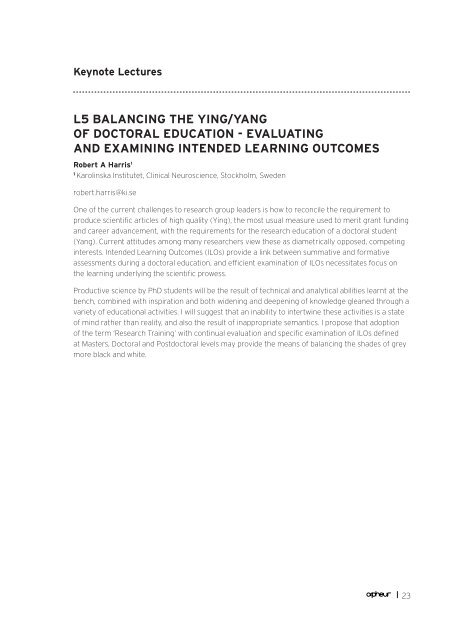PDF conference book - ORPHEUS
PDF conference book - ORPHEUS
PDF conference book - ORPHEUS
Create successful ePaper yourself
Turn your PDF publications into a flip-book with our unique Google optimized e-Paper software.
Keynote Lectures<br />
L5 BALANCING THE YING/YANG<br />
OF DOCTORAL EDUCATION - EVALUATING<br />
AND EXAMINING INTENDED LEARNING OUTCOMES<br />
Robert A Harris 1<br />
1 Karolinska Institutet, Clinical Neuroscience, Stockholm, Sweden<br />
robert.harris@ki.se<br />
One of the current challenges to research group leaders is how to reconcile the requirement to<br />
produce scientific articles of high quality (Ying), the most usual measure used to merit grant funding<br />
and career advancement, with the requirements for the research education of a doctoral student<br />
(Yang). Current attitudes among many researchers view these as diametrically opposed, competing<br />
interests. Intended Learning Outcomes (ILOs) provide a link between summative and formative<br />
assessments during a doctoral education, and efficient examination of ILOs necessitates focus on<br />
the learning underlying the scientific prowess.<br />
Productive science by PhD students will be the result of technical and analytical abilities learnt at the<br />
bench, combined with inspiration and both widening and deepening of knowledge gleaned through a<br />
variety of educational activities. I will suggest that an inability to intertwine these activities is a state<br />
of mind rather than reality, and also the result of inappropriate semantics. I propose that adoption<br />
of the term ‘Research Training’ with continual evaluation and specific examination of ILOs defined<br />
at Masters, Doctoral and Postdoctoral levels may provide the means of balancing the shades of grey<br />
more black and white.<br />
23


